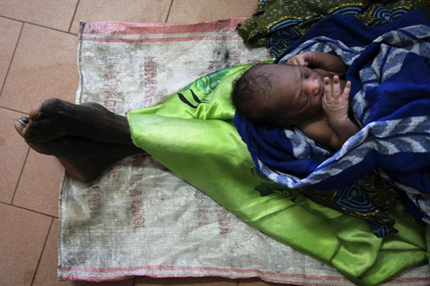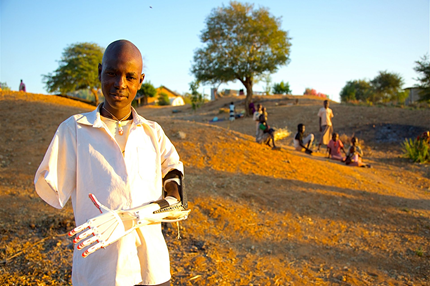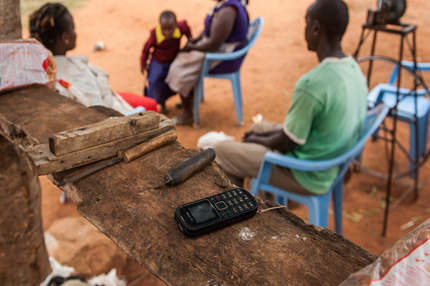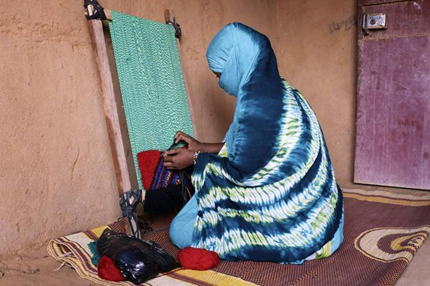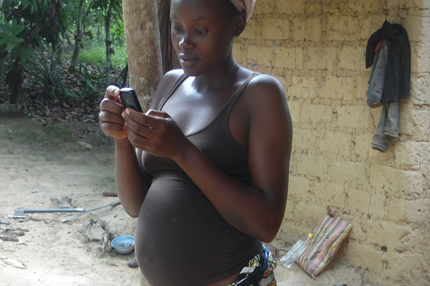No sleep for Congolese mothers trying to save their girls from rape
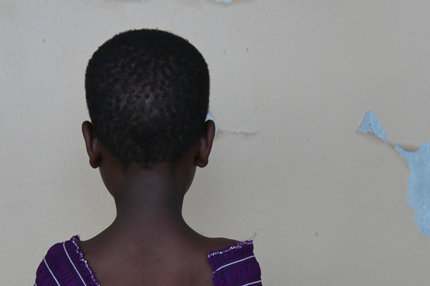
A girl from Kavumu in DRC who was abducted from her home and raped. Since 2013, 49 young children in the town have been raped. Photographs: Ruth Maclean for the Guardian
Officially, sexual violence has declined in the Democratic Republic of the Congo, dubbed the ‘rape capital of the world’. But frontline workers tell a different story
“I’m scared. In my area, everyone’s scared,” said Felicia, the mother of a nine-year-old girl, Charlotte, who was raped last year and who sits in silence next to her
The mothers of Kavumu hardly sleep. But on rainy nights, they don’t even try. The rain pounds on their tin roofs so noisily that they worry they won’t hear rapists breaking in to steal their daughters. So they sit up all night, just watching their front doors.
Since 2013, 49 young children, one only 18 months old, have been abducted from flimsy houses in this town in the east of the Democratic Republic of the Congo – and raped. The alleged ringleader of the militia responsible, an MP, was arrested earlier this year, but it is common knowledge in Kavumu that many of their daughters’ “destroyers”, as they call them, are still at large.
“I’m scared. In my area, everyone’s scared,” said Felicia, the mother of a nine-year-old girl, Charlotte, who was raped last year and who sits in silence next to her.
Branded the “rape capital of the world” in 2010 by Margot Wallström, the former special representative on sexual violence to the UN, the DRC has been trying to get rid of this moniker ever since.
President Joseph Kabila claimed recently that the DRC was “held up as an example” of how to fight sexual violence, in a rare speech he made to justify staying on as president after his constitutionally mandated two terms officially come to an end this month.
However, despite a sustained PR campaign by the Congolese government to persuade the world that the number of rapes has fallen by 50% in two years, figures obtained by the Guardian show that it has hardly changed, and this has been echoed by people working on the frontline of the fight against sexual violence. Some even say it is rising.
Chief of the government’s strategy is Jeanine Mabunda, the special adviser on sexual violence to the president. Kabila appointed Mabunda a month after Angelina Jolie and William Hague’s landmark summit on sexual violence in conflict in London in June 2014, by which point indignation at the Congolese government’s failure to act had reached a crescendo. Mabunda’s was a high-profile appointment, working across government ministries and with Kabila’s ear, and people who had been trying to stem the rising tide of rape greeted her appointment with hope.
Women's rights and gender equality, we highlights issues affecting women, girls and transgender people.


In October, Mabunda flew into Kavumu airport. But she did not stop to talk to the rape survivors. She was with Zainab Bangura, the UN secretary general’s special adviser on sexual violence in conflict, who was paying a last visit to the country after four years in the job. Mabunda and Bangura hopped into their waiting 4x4s and sped through the town in a large convoy on their way to Bukavu, a nearby city where they had a new police building to inaugurate.
At Bukavu police station, Mabunda gave a speech. “The number of rapes in the DRC has fallen by 50% in two years,” she said. The assembled dignitaries, including the province’s governor, and the head of its UN peacekeeping force, clapped. In recent months, Mabunda has repeated this claim many times: at a high-level conference on rape in conflict in Kinshasa, the capital, at meetings and press conferences across the country, and on her social media accounts.
This is not the case, say the doctors who try to heal the physical scars resulting from rape, the lawyers battling with a largely non-existent justice system, and the Congolese activists trying to rebuild the lives of women who are often abandoned by their families and communities.
“The 50% drop? It’s not true. It’s going the other way,” said one aid worker, who spoke on condition of anonymity.
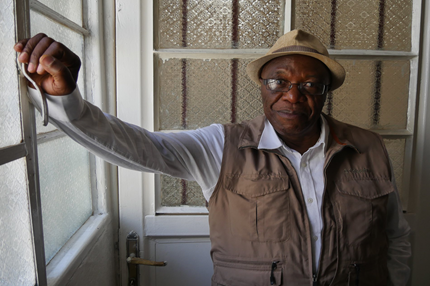
Dr Jo Lusi, founder of the Heal Africa hospital, which has treated thousands of rape survivors
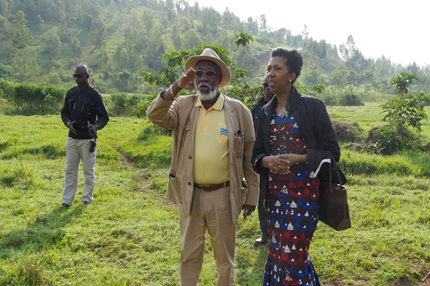
Jeanine Mabunda looks over the site for a memorial garden to rape survivors not far from Kavumu, in eastern DRC
Reliable data is difficult to get in the DRC, but figures collected by the UN population fund ( UNFPA) indicate that incidents of gender-based violence have decreased from 19,937 in 2013 to 19,192 in 2015 – a 4% drop. The number of rape victims coming to the Heal Africa hospital went up in the same period by 28%, and 2016 was on track for an 84% increase from 2013. Data collected by the UN peacekeeping force shows a 25% drop in conflict-related rape in the country’s east, but people working there warn that there have been so many cases of rape and mass rape so far in 2016 that the numbers might well rise again.
Even if conflict-related rape has gone down, that does not mean the numbers have gone down overall, just that the type of sexual violence is changing, according to Julienne Lusenge, a leading women’s activist in eastern Congo. “Although there might be a drop in rape as a weapon of war, what we call civilian rape is on the increase,” said Lusenge. “There are places where it has calmed down a little, there’s peace, and rape linked to conflict has died down a bit. But now there’s a different problem. Now, rape is all over the country. It’s spread everywhere.”
The epidemic of rape began in 1998, perpetrated by the many rebel groups that destabilised the east of the country. Insecurity suits these groups, and systematic gang rape engenders deep insecurity. Demobilised rebels later employed by the country’s security forces have continued the tide of violence.
Mabunda acknowledged that trying to solve the rape problem without stopping the conflict was useless. “To address sexual violence, you have to install peace,” she said.
After peace, the stigma associated with rape needs to be broken down. Mabunda launched a campaign to “break the silence” on sexual violence by putting up billboards and set up a call centre to encourage people to speak out. But like millions of poor Congolese, few of the Kavumu mothers can read the billboards or call the number – they are illiterate and cannot afford phones.
A special police unit for the protection of women and children supported by the UN is doing good work, and was responsible for the arrest of the MP leading the militia raping the Kavumu girls. However, its resources are extremely limited, and little has been done about endemic corruption in the wider police and army.
This experience was borne out by Felicia, when she woke up, found Charlotte gone and raised the alarm. Soldiers eventually found Charlotte in the bush, with horrific injuries from her rape. But rather than take her to hospital, they took her to the police station. Felicia was accused of handing Charlotte over to her rapist herself, and was arrested along with her two other children. They kept mother and daughter apart for a day – with Charlotte in severe pain after the rape – and tried to extort money from Felicia, a subsistence farmer who had nothing. “While I was crying for my daughter, they were demanding money to release us,” Felicia said.
Although the government has worked to change the legal framework surrounding rape, which experts say is now strong, corruption is rife in the courts and prisons, where officials are often paid off so that perpetrators can go free.
Accessing justice in the first place is extremely challenging, said Charles-Guy Makongo, director of the American Bar Association in the DRC. “It’s very difficult for a woman to follow her case from the police to the courts, because of distances to travel, money and ignorance.”
Mobile hearings, courts transplanted to villages by the UN and NGOs, have secured convictions where they have been implemented. “But mobile courts are not the final solution,” Makongo said. “We need to get people access to justice everywhere.”
Kabila’s 2013 promise of zero tolerance for sexual violence and fighting impunity has led to nothing, say those working on the frontline.
“The government doesn’t exist, except when they’re collecting tax or trying to show the world something,” said Dr Jo Lusi, head of Heal Africa, a hospital and Christian organisation that has helped thousands of rape survivors. “The problem of health, of education, of conflict management is yours.”
Mabunda acknowledged that the task she faces is enormous. “You have to install institutions like mayors, police, local government. You have to bring prosecutors, military or civilian. You have to put perpetrators in jail. This is a huge effort and costs money, and we don’t have that much money.”
With a budget of $1.4m (£1m), there is not much Mabunda’s office could achieve on the ground on its own. Her advantage is rather her political clout and high profile.
“We know how far she can reach,” Lusi said. “She knows people who can take decisions. If she wants, she can unlock the situation.”
Instead, she is focused on persuading the world that the problem has gone away, said a much-lauded women’s activist who spoke on condition of anonymity. “Kabila only appointed her to show the international community he’s doing something about sexual violence, but there’s nothing there,” she said. “They play games. It’s like ‘pretend’.”
A UN employee who has worked on sexual violence in the DRC for years, and who also asked to remain anonymous, said the government’s claims that it was doing anything to stop rape were “completely outrageous”.
Mabunda defended her approach. “I am trying to change the narrative,” she said. “We were called the capital of rape. You have to change that. You have to explain to people what you’re doing, what is the impact.”
Hundreds of thousands of dollars have gone on hiring a Washington-based PR firm to help her in this goal. And her mission appears to be working.
Even Bangura repeated the claim that rape had fallen by 50% and said that she considered the DRC a “laboratory” whose lessons could be applied elsewhere. Her team later clarified Bangura’s comments, saying she was referring to the proportion of sexual violence in conflict committed by state security forces – not the absolute number.
But Mabunda’s claim is hampering NGOs’ efforts to fight the epidemic, organisers say, as thinking the problem is on its way to being solved, donors are taking their money elsewhere. “Our programmes are not supported like before. There is a big reduction in funding,” said William Bonane at Heal Africa.
According to the OECD, aid given to the DRC in support of gender equality and women’s empowerment fell by $40m between 2013 and 2014.
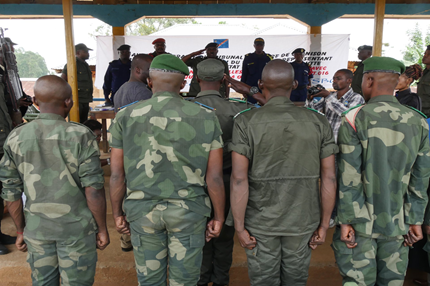
Men are tried for rape by a military judge in a mobile court in Oicha village, North Kivu province
Most people working in the field are too afraid to speak out, aware that they may risk the same fate as Denis Mukwege, a world-famous gynaecologist and outspoken critic of the government, who has survived several assassination attempts. His hospital almost had to close last year when, having been tax-exempt like all Congolese hospitals, the government suddenly presented it with a $600,000 bill for years of back taxes. This demand was withdrawn after an international outcry.
Several of the organisations that collect data refuse to give it out; some having been expressly forbidden to share it.
Mabunda’s office is trying to raise $200,000 to create a memorial garden to the country’s rape survivors, not far from Kavumu. The British government is reportedly considering a contribution.
But the Kavumu victims and their families know nothing of these plans. What they want is for all of their daughters’ rapists to be arrested and tried, so they can sleep at night. Their hiding-place is well known in the community, according to Felix Mugisho Maroyi, who has been leading the local fight for justice since their last advocate was shot dead at his Kavumu home in March. “The government is not unable to arrest them – I think it’s a lack of will,” he said.
In Minova, where more than 100 women were raped, only two low-ranking soldiers were convicted, and in Walikale, where 387 civilians were raped, six years later none of the perpetrators has been brought to trial. One general was convicted of rape in 2014, but his case has not led to other high-ranking officials being held accountable.
Reparations could give the families in Kavumu back their security: they could sleep easier at night if they had walls made of bricks, not mud, and if they could buy padlocks to put on their doors. At the moment, they can barely feed their families.
The DRC has signed up to several international and regional human rights instruments that oblige it to guarantee reparations for sexual violence survivors. But not one survivor of sexual violence in the DRC has received any money from the state, despite the fact that several courts have ordered it.
“Nobody from the government has come to help us,” Felicia said. “Sometimes we hear them saying on the radio that they’ve given the victims this and that, but we’ve never had anything, so we don’t know where the money is going.”
Another Kavumu mother, whose daughter Natasha was abducted and raped when she was six, said that even a visit and some kind words would have gone a long way. “I didn’t think many people would help us, but when you have a problem, you think maybe one person will come and say ‘pole’,” she said, using a Swahili word that means … ‘sorry, I sympathise’. “Nobody has come.”
Names have been changed to protect identities


YOU MAY ALSO
LIKE:...
GREAT DEALS FOR
YOU:...

SUGGESTED FOR
YOU

SPONSORED CONTENT


YOUR SHOPPING MADE EASY
Africa's Change Makers Magazine
COMPANY
AFRICAN ACHIEVERS INTERNATIONAL Inc. is a global media and technology company including lifestyle media publisher SEMA AFRICA
online
Magazine AFRICAN ACHIEVERS MAGAZINE, digital shopping
platform PA-BEAUTY STATION.COM, event management
PRIDE OF AFRICA, awards program AfIA
AWARDS, youth and talent development, PILLARS OF
HOPE and AAK, Volunteerism
UNIVERSIDAY grassroots community support
NAD and financial support
REMITGROW and monthly subscription box AAi Must
Have. ....
More from African Achievers International
SUBSCRIBE








